- Home
- Kate Quinn
A Song of War: a novel of Troy Page 20
A Song of War: a novel of Troy Read online
Page 20
But he was fast. His own sword came up and parried the blow, the impact so great that it sent Paris’ weapon spinning from his grasp. Agamemnon glanced once again at Talthybius.
“It’s not over yet, my king,” he said.
Paris was backing away, wracked with pain from his wound, visibly sobbing. The Trojans roared him on. Even if was a weakling, he was a prince of Troy, and he bore their honor. Honor that was cowering behind its tower shield, desperate to survive a fight it couldn’t run from.
Agamemnon was growing to love honor. It made fools of men more than a woman could.
Menelaus stalked his hated enemy, sword poised, waiting for a clean opening to present itself. But the tower shield was huge, designed to protect a man from nose to shin, and if he wasn’t engaging, all that remained was for the attacker to wear him down. And that could take a while, Agamemnon thought.
Menelaus clearly realized this, too. Roaring with fury, he closed in and grasped the top of Paris’ shield with his left hand, pulled it aside, and brought the blade of his sword down on the younger man’s helmeted head with tremendous force.
The clash was brazen, piercing the shouts of the men with a keen note. Paris fell to his knees, leaving a dumbstruck Menelaus standing over him—and staring at the broken nub of his sword. A fitting metaphor, Agamemnon reckoned.
It was hardly a contest. It was a farce, and Agamemnon was desperate for his brother to kill Paris so the real battle could begin. The subsequent loss of Menelaus would be unfortunate, but then, without Menelaus, the Trojans would have no one to give Helen back to, and Agamemnon could wage the war in honor of his dead brother.
Menelaus was now dragging Paris back toward the Achaean lines, too furious to bask in the adulation of the soldiery. He had grasped the Trojan prince’s war-helm and was pulling him along on his arse as Paris gagged on his chin strap.
Which, of course, broke.
Some of the men were openly laughing now; Agamemnon would have joined them if the implications of Paris actually surviving this weren’t so serious. The Trojan prince was up and running toward his own lines. Menelaus cast his shield aside and lumbered after him, inducing more hilarity from the Achaeans and heaping intolerable shame on the Trojans. All of a sudden, Menelaus slowed his run and began to stagger like a drunkard. A black arrow protruded from his side, and blood coursed down his leg.
Agamemnon sighed in relief and lifted his voice. “The Trojans have betrayed us!” he screamed. “They broke their oath! Kill them before the gods! Kill them all!” He raised his spear.
“What about Menelaus?” Talthybius shouted.
“Get him a fucking surgeon!” Agamemnon snarled. “Forward!”
The charioteer flicked the reins, and the horses responded. Agamemnon heard his men roaring in fury now. The Trojans were dressing their lines, but the ease of Paris’ defeat had surely sucked the morale from them.
Agamemnon’s face split in a fierce grin, the daemon of combat rising within him. Now he would give vent to his hate. His frustration. His loss.
The Trojans would pay.
The sound of the lines colliding was like slamming the doors to Tartarus, a mighty crash intermingled with the pitched screams of men. After the initial clash, there was no end to the cacophony, no raising or lowering in its intensity—just a constant deluge of noise that drove a man mad with battle lust or fear.
Agamemnon’s spear was red to the haft in sixty heartbeats, men falling around the dual chariot as though he were reaping grain. He screamed in fury, each blow a punishment for what had been taken from him. Hatred seared through him, giving his arm a strength he had not known since his youth.
“Iphigenia!” he cried. “Iphigenia!” From now on, her name would be his battle cry. For if he fell, the last name on his lips would be that of his beloved child. Who had, perhaps, forgiven him. “Iphigenia!” As far as he was concerned, this entire war could be sung to future warriors as the Song of Iphigenia. A song of dishonor rather than heroism, of dishonor and murdered innocence. A song of wasted years.
A chariot sped toward them, its driver wild-eyed, screaming as his champion readied himself.
“Hold fast, my king!” Agamemnon's charioteer shouted. He pulled hard on the reins and the dual chariot—much heavier than the box—slid along and smashed into the Trojan vehicle.
The impact overbalanced the Trojan champion, and Agamemnon reached out and tore him from the chariot car, sending him facedown into the dust. The high king rammed his broad-bladed spear into the man’s back, through his armor, feeling the blade grate on his spine. The warrior may have screamed, but it was drowned out in the tumult of battle. But he was dead; the ripe smell of his bowels opening as he went to Hades told Agamemnon that. He twisted the spear and pulled it free, turning to see the two charioteers wrestling like flute girls playing at Amazons. He stuck the Trojan fellow in the side and laughed as he fell.
He took a moment to survey the field. He spied Diomedes and his lion-skin cloak in the thick of it, a whirlwind of death, men, and champions falling to his spear as though he were Ares himself. It seemed to Agamemnon that Achilles wasn’t needed, after all. Diomedes plowed on, killing and killing and killing.
“Go!” Agamemnon yelled to his charioteer, blood pounding within him, his desire hot for more death.
And more death he sowed. There was no weariness in him, no sapping weakness, no thirst to slake. Only the desire to kill. His chariot was slick with the blood of the enemy, his spear coated in it, his armor burnished in it.
It was slaughter without end, and Agamemnon drank it as he had once drank wine. And he was drunk.
When the horses were blown, he leaped from the chariot car and fought on foot, screaming Iphigenia’s name as he made murder amongst the enemy. He rammed his spear into the belly of a man who wailed like a boy as Agamemnon dragged his guts out with the bronze barb of the warhead, turned, took a blow on his shield, and then smashed it into his assailant’s face. Agamemnon kicked him in the balls and thrust the spear into his back when he went down, sending a geyser of black blood skyward.
“Agamemnon!”
A challenge.
With a roar, he turned to see Odysseus and Ajax the Ox before him. “What the fuck are you doing!” he screamed, his throat ragged from his war cry. “Get back in the fight, you gutless cowards! We’re going to break them! The day is ours!”
“It’s not, you fool!” Odysseus grasped him by the shoulders. “The Cretans are breaking, the Athenians, too. It’s you and Diomedes who’ve done the damage for us, but our men are weak from the plague!” The way the ugly little Ithacan said it—so pronounced—cut through Agamemnon’s battle rage, dousing the fire with ice.
“What?” He blinked. “No... we’re winning. Diomedes... ”
“Diomedes almost killed Aeneas of Dardania,” Ajax the Ox noted. “Knocked those sea-colored feathers right off his helmet.” Which was off the subject and garnered him an annoyed look from Odysseus.
“Look around you,” the Ithacan said as Agamemnon’s charioteer drove back toward him—clearly on Odysseus’ orders. “Look!”
It was true. Around him, he could see that the Trojans—far from being broken—were making a fight of it. And in that moment, Agamemnon realized that his fears could come to pass. That he could lose it all here and now because if his men broke, it would be all over. He would not be avenged, and Achilles could laugh and spit on his corpse and go on to say that he was the greater man. That his precious honor had proven him right.
That, Agamemnon could not countenance.
And then, as it had before, honor came to his rescue.
“Hear me!” a voice boomed out in accented Achaean. “Hear me!”
A huge figure strode from the lines—almost as huge as Ajax. Prince Hector. The fighting began to slow, and the men pulled away from each other, their battle lust spent.
Agamemnon looked around. It was utter carnage. Bodies, many stripped of armor, littered the field. The ground was bla
ck with blood, and the flies were thickening already. The stench... shit, puke and copper... hung in the air like an obscene hecatomb.
“Many are dead,” Hector intoned. “Yet no victory is won... for either side. The day started with a duel... ”
Hector looked around, realization dawning in his eyes. Agamemnon saw that the Trojan prince had lost his nerve and thrown his dice too soon. If he had waited, the Achaeans could well be in flight. But he hadn’t. And victory, that fleet-footed whore, had vanished.
“The day started with a duel... and should finish with one!” Agamemnon shouted in order to make sure he left Hector with no way out. “After your brother’s shameful display, it surprises me you make this offer, Prince Hector. But we will accept it because I am a man of... honor.”
“You will face me, Agamemnon?”
“I am a man of honor,” Agamemnon said again. He felt a stab of fear pierce his heart of bronze. He was no match for Hector, but he could not admit it, nor could he run. “As the kings and princes of my council are men of honor. I propose we draw lots, and whosoever draws Hector’s name will have the honor of killing him before his city.”
That at least lowered the odds.
Hector accepted, as Agamemnon knew he must. The high king was glad of the respite. The more he looked around, the more he saw how exhausted the Achaeans were. The Trojans, too, were in a state: a hard day.
Later, the result of the lots were called by Talthybius, and Agamemnon allowed himself a laugh at Odysseus’ snide “nicely done” as Ajax’s name was called out as “victor.” The Ithacan was too wily not to have guessed that the lots were rigged, given that Talthybius was the man assigned the job of drawing them.
Agamemnon’s legs were sore from the day’s fight, and he no longer felt young. “You’re an intelligent man, Odysseus,” he said quietly. “You should understand how the game is played.”
“Oh, I do,” the little Ithacan said. “I do. It’s one of the reasons you’re still high king. I know you, Agamemnon.”
He didn’t extrapolate. He didn’t have to. Agamemnon knew that Odysseus despised him, but the man knew—as Agamemnon himself knew—that the high king could not play fair. The high king had to balance egos. Had to balance risk and opportunity. Had to balance the details of men lost and men replaced. Had to balance prizes.
Because that was what it all came down to in the end.
Even now Hector and Ajax were chatting like old friends, each promising to honor the other’s corpse and stating what prizes they would take from each other.
“King Menelaus survived,” Odysseus said conversationally. The look in his eyes told him that he at least suspected Agamemnon had orchestrated the “treachery.”
“I’ll sacrifice to the gods in thanks,” he muttered, the flick of his glance telling Odysseus that he didn’t care what the little man thought. Or the gods, for that matter.
“Who do you think’ll win?” Odysseus asked as he lowered himself to the ground.
“I don’t know,” he said. “Look at the size of them. It’ll probably go on all night.”
“Fancy a cup of wine?”
For a moment only, Agamemnon was tempted. But only for a moment. He shook his head. Besides, the offer had been made from sufferance on politeness. Even if Odysseus was one of the few who realized what kind of man it took to be high king, it didn’t mean that he looked on such a man with any kind of empathy. Odysseus still despised him as much as the others, perhaps even more so—precisely because of his insight. But he would be an ally from now on. He had intelligence. Agamemnon would use that.
He gave the Ithacan a nod and walked away as the combat began. He thought of Chryseis and what might have been. He thought of their unborn child and what might have been. He thought of Iphigenia and what might have been.
What should have been.
And then he thought of Achilles, who he hated and who hated him. Achilles, who would die. Because men like Achilles... Hector... Ajax... they always died. Because they had honor.
Men like Agamemnon survived.
He had come full circle. Once, it had been ambition that drove him, the desire to be remembered as the high king who brought Troy low. Ambition, hope, love, and yes, honor, had been drained out of him, soaked into the Trojan ground. It was a bleed that had begun when he agreed to the sacrifice at Aulis and had finally run dry the moment that Chryseis was taken from him.
He had become a shell of a man. A man without honor. A man without care. And he was prepared to do what it took... anything it took... to achieve his aims. He recalled the promises that he made to Chryseis. That he would find her, would upend the world looking for her when this war was done.
Promises he would not keep.
Because his love for Chryseis had made him weak. And a high king could not afford to be weak. A high king could not afford to love. Ultimately, to be high king was to be alone.
It was a liberating realization.
THE FOURTH SONG
The Duel
by Christian Cameron
Οἰ μὲν ἰππήων στρότον, οἰ δὲ πέσδων,
οἰ δὲ νάων φαῖσ’ ἐπὶ γᾶν μέλαιναν
ἔμμεναι κάλλιστον, ἐγὼ δὲ κῆν’ ὄτ-
τω τις ἔραται
Sappho
BRISEIS
I had heard about the war all my life. Now it was my life.
After the fall of my city of Mythimna, I became first a widow, then a spear-bride, and then a slave. The singers claimed that Prince Achilles of Phthia stole me, but they are wrong, for I chose him as the strongest of men. I’d been a queen, and a queen never went cowering toward her fate.
She chose it, ran to it, and clasped it with both hands.
Now, after so much had been taken from me—my first husband, my family, and even my homeland—the Fates ripped from me even this choice that I had made.
For now I was a slave in the quarters of the high king, Agamemnon of Mycenae, leader of the massed Achaean forces, who used me neither for my prowess at driving a chariot or my knowledge of rites to honor the great goddess, nor even for the simple passion of my dance, but for my ability to empty his chamber pot.
Now my existence had been narrowed to wishing for two things: Agamemnon’s death and my return to Achilles. If Achilles would take me, smelling of his rival’s shit. For while Achilles had razed my city, I had found some brief happiness with him when he had made me his... his... Never mind.
Achilles was a hero to match Prince Hector of Troy, whereas Agamemnon...
Let’s just say I had a low view of the man who made me scrub his shitpot.
Yet I was proud that I never cowered before him. His shit might stain my hands, but I was still a queen in my heart despite the daily humiliation. I was protected. I could see it. None of the spearmen, the lowborn, tried me; none of them attempted my body. It was as if I could feel the spear of Achilles over my shoulder. That was a comfort because the insults and the chamber pots came thick and fast, and my hands were the angry red of a slave’s hands from washing.
There are many forms of humiliation. There were women in the Achaean camp who were used brutally. I will not dwell on them, but there were women who had been as powerful as I, with some lowborn spearman’s seed in them, bearing babies they would hate, except that they knew as well as I that they would never again be welcome in their homes, even if their homes were not taken and sacked and everyone they knew dead. I saw Lycoma, wife of Cebriones, one of King Priam’s sons, pregnant, bruised, filthy, and hollow-eyed. And I saw others humiliated in other ways; women who traded their honesty for survival and were reviled as whores; women who protected their children with their own flesh. War is brutal, but it is far more brutal to women than men, who, mostly, can only die when their bodies are torn asunder rather than live on with their lives torn out like the entrails of an antelope taken by dogs.
So trust me when I say that my daily task of cleaning the hi
gh king’s excrement was merely foul. And the camp was full of disease; indeed, it was by far the greatest killer of Achaeans, far deadlier than the Trojans. So many of the Achaean spearmen were sick that their ranks were thin, and I heard other slaves predict a great defeat. I had been Agamemnon’s lowest slave for two or three hands of days when I began to learn one of the great lessons of being a slave: how to avoid work. When the fighting intensified on the great dusty plain between Troy and the fortified Achaean camp, all the men would go to the camp’s walls as if it was a great game, which I suppose it was. And I found that I could drift with the other slaves. Sometimes we’d be barked at, but usually no one troubled us; if I put my hair in a linen wrap, with my slim body like a boy and the brown stains on my old robe, no one troubled me.
And I liked to watch them kill each other. I am god-born, of the highest nobility. War is our pastime and chariot combat our highest art. My father wanted a son, and for years he raised me to be his son. I ran with boys, fought with sticks, and killed animals in sacrifice and in hunting. When I used my fists on other children, my nurse would sometimes tell me to use my “wiles” instead, but I was sadly lacking in wiles back then, I fear. My mother despaired of me; she got other women to teach me the dances and said I was more man than woman.
Yes...
And I could drive my father’s chariot. It began as a joke, but he had a young slave, Dion, train me, and until my breasts budded, I sometimes drove for my father in the jousts on the Field of Ares. Men said I was too small to hold the horses, but with the reins round my waist, I could hold even his strongest pair, if Dion helped me tack them up. I loved to drive; even after I came to womanhood, I would do it in secret, with Dion’s help, until he became my brother’s charioteer.
It is perhaps curious that the two things I liked best were horses, who “belong” only to men, and dancing, which belongs almost entirely to women. But I leave my path. I only wanted to say that when the rest of the slaves watched the fighting, it was to avoid work, but I watched it with a certain appreciation of the skills involved.

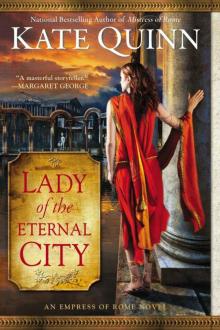 Lady of the Eternal City
Lady of the Eternal City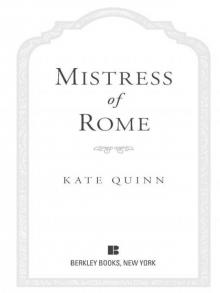 Mistress of Rome
Mistress of Rome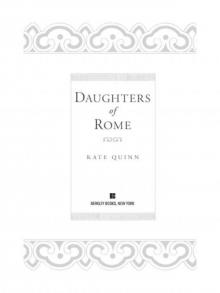 Daughters of Rome
Daughters of Rome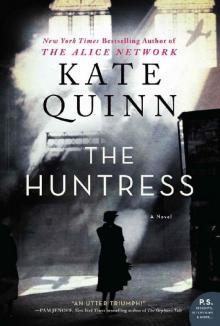 The Huntress
The Huntress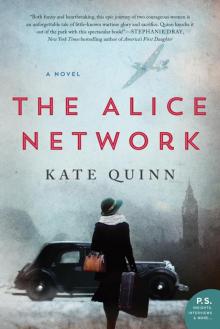 The Alice Network
The Alice Network The Lion and the Rose
The Lion and the Rose Empress of the Seven Hills
Empress of the Seven Hills The Serpent and the Pearl
The Serpent and the Pearl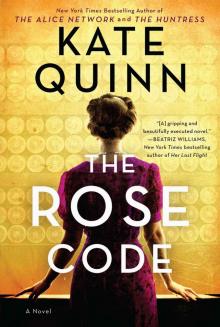 The Rose Code
The Rose Code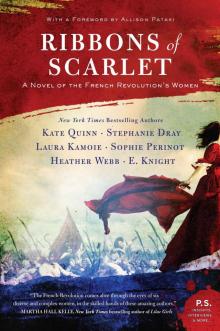 Ribbons of Scarlet
Ribbons of Scarlet A Song of War: a novel of Troy
A Song of War: a novel of Troy